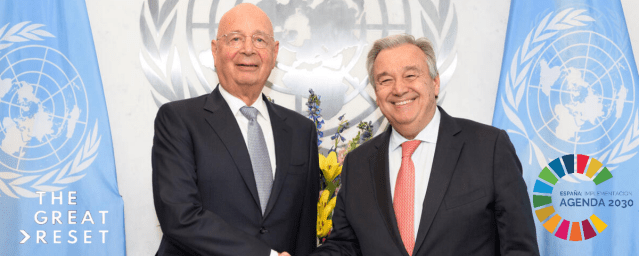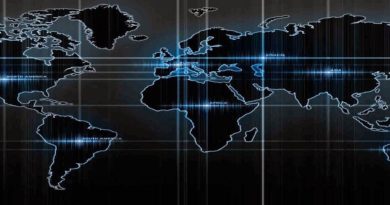The U.N. & World Economic Forum are using each other to implement ‘Agenda 2030’ & ‘The Great Reset’
The United Nations (“UN”) “unites” the governments of 193 countries of the world. Whilst the World Economic Forum (“WEF”) “unites” 1,000 of the world’s largest corporations. The two are joined by a strategic partnership to implement the UN’s Sustainable Development Goals of Agenda 2030. An agenda which aims to control every aspect of our lives.
None of these organisations or companies has officials which represent the people. We have not elected them into office to govern or make decisions on our behalf. And, no electorate has been asked if their goals are our goals or if their goals will create the world we, the people, want.

The UN’s Agenda 2030 for Sustainable Development (“Agenda”)
The Agenda, and the Green New Deal, are the ugly sisters of Agenda 21.
According to the Agenda, the 17 Sustainable Development Goals “clearly define the world we want – applying to all nations and leaving no one behind”. The UN makes clear that “business has to play a very important role in the process”.
Paragraph 28 of the Agenda states that “we commit to making fundamental changes in the way that our societies produce and consume goods and services.”
Paragraph 52 states that this journey “will involve Governments as well as Parliaments, the UN system and other international institutions, local authorities, indigenous peoples, civil society, business and the private sector, the scientific and academic community – and all people.”
Within the UN’s Sustainable Policy, which Britain has adopted, we find the objective to remove private ownership whilst at the same time we also find the objective to re-wild the countryside – the UN envisions that most of the people in the world will be living in cities by 2050.
The Agenda is “a codename for a master plan at the United Nations to change the political and economic system of the world to one of collectivism. And in order to do that people must not be allowed to have independence. They must be dependent on the state otherwise they won’t be easily controlled by the state. That means they can’t have private property. They can’t have land of their own. They have to live in, preferably, high-rise apartments that are provided to them by the state as a benefit, so to speak,” says G. Edward Griffin, “in order to control mankind you have to get them all into the big cities. You have to get them dependent on the state for food, shelter, electrical power, their water. everything.” That’s the dirty secret behind the Agenda. (see the documentary ‘Unsustainable – The UN’s Agenda for World Domination’ below).
The Agenda has been rolling out, bit by bit, to cities throughout the world for years. Local governments are incentivised through handouts from their central governments to implement it. For example, at various times the UK adopted the ‘Core Cities Group’, the ‘100 Resilient Cities Project’, and the ‘Global Parliament of Mayors’ movement. These initiatives aim to gain total control of the levers of power in our cities and regions. The Agenda is a “global movement, coordinated through a global to local action plan.” A key facet of that action plan is to push the agenda down to the most local levels in society. There are multiple paths and they all lead to a ‘One World Government’.
The same has been happening in the United States as explained in James Jaeger’s documentary (below). Although it’s lengthy at 2.5 hours, it’s well worth watching as it gives a deeper understanding of the Agenda, how it’s being implemented and its local and global impact. While watching you will find you are able to draw parallels to what is happening in your own locality.
According to Celeste Solum the Agenda was brought forward and “by 2025 they do not want us to take anything from nature, anything we consume will be laboratory generated.”
Proof the Agenda has been brought forward can be seen in the UK. The Government’s ‘Absolute Zero’ report originally aimed for net zero carbon emission by 2050. However, the Government enshrined in law a new target in April 2021 to cut emissions by 78% by the year 2035.
The WEF and the UN’s Agenda
The WEF, a global NGO based in Switzerland, is mostly funded by its 1,000 member companies as well as public subsidies. It has been listed as a participant of the UN’s Global Compact since 15 July 2003. Global Compact is a mechanism to advance the global goals of the UN.
The WEF’s Board of Trustees include:
- Christine Lagarde – President European Central Bank
- Larry Fink – Chairman and CEO Blackrock
- Christina Freeland – Canada’s Deputy Prime Minister and Minister of Finance
- Tharman Shanmugaratnam – Senior Minister, Government of Singapore
- Mark Carney – formerly Governor Bank of England and now UN Special Envoy for Climate Action
- Al Gore – former Vice President, United States, founder and chairman, the Climate Reality Project, a non-profit organisation “committed to solving the climate crisis”
In June 2019, the UN-WEF Strategic Partnership Framework (“Partnership”) was signed to accelerate the implementation of the Agenda. The WEF represents the financial “elites.”
The WEF states: “The Partnership identifies six areas of focus – financing the 2030 Agenda, climate change, health, digital cooperation, gender equality and empowerment of women, education and skills – to strengthen and broaden their combined impact by building on existing and new collaborations.” Climate change, health, gender equality and education are four of the 17 Goals of the Agenda.
In October 2019, the WEF teamed up with Johns Hopkins University and the Bill and Melinda Gates Foundation to stage a pandemic exercise, Event 201, which simulated a coronavirus outbreak.
In March 2020, a worldwide coronavirus pandemic was declared by the World Health Organisation. The WEF played a key role in the launching of the March 2020 lockdown. Since then, we have seen indications of the WEF fulfilling its side of the Partnership to “strengthen and broaden” the combined impact of the Agenda’s goals.
In July 2021, the WEF hosted Cyber Polygon 2020 the central theme of which was a “digital pandemic.” The language used for this event was bizarre and we should suspect that specific language was selected – carefully crafted, carefully put together – to be more than simply “words on a page.”
The promotional video (below) for the Cyber Polygon 2020 event states: “Fortunately, at least until now, cyber-attacks have not impacted our health the way pandemics have. At least until now.”
In August 2021, the World Economic Forum announced plans to establish a new global Centre for Urban Transformation, headquartered in Detroit, to increase public-private collaboration in cities and advance more inclusive and sustainable models for urban development.
“By 2030, six out of every ten people in the world are expected to reside in cities,” said Maimunah Mohd Sharif, Executive Director of UN-Habitat. “We need an urgent change in mindsets, policies, and approaches towards urbanisation to ensure nobody is left behind. We look forward to working with the World Economic Forum to advance the New Urban Agenda and Sustainable Development Goal 11 to make cities inclusive, safe, resilient and sustainable.”
WEF Partners
As mentioned above: the Agenda states it will involve business and the private sector; and, the WEF represents the financial “elites.” It follows that the WEF is being used as the bridge between the UN and businesses, the private sector, to implement their Agenda.
The WEF has one Strategic Foundation Partner, the Bill & Melinda Gates Foundation, one Strategic Technology Partner, Salesforce, and 100 Strategic Partners comprising leading companies from around the world, each selected for their commitment to improving the state of the world.
The Strategic Partners “believe in the power of collaboration” to drive change, and to “help shape industry, regional and global agendas.” Strategic Partners include: Amazon, AstraZeneca, Blackrock, Facebook, Google, Johnson & Johnson, Morgan Stanley, Open Society Foundations and Pfizer. All but a few of the major players, media excepted, who we strongly associate with the Covid “pandemic.”
Surprisingly Twitter and Moderna are not WEF Strategic Partners. However, Twitter’s top three institutional owners are Morgan Stanley, the Vanguard Group and BlackRock. And, the top institutional shareholders of Moderna are Baillie Gifford & Company, and Flagship Pioneering Inc. (founded by Noubar Afeyan) followed by Vanguard, Blackrock and Morgan Stanley.
One of the biggest fund managers in the in the world – The Vanguard Group – is not listed as a WEF strategic partner and is noticeable by its absence. However, it may not be necessary for them to be “visible” as the “Big Three” – Blackrock, State Street and Vanguard – together form a hidden monopoly on global asset holdings. The two biggest are Vanguard and Blackrock, and Vanguard is the biggest shareholder of Blackrock.
In addition to the “Big Three’s” shareholdings of corporations who are WEF strategic partners, through their influence over centralised media, they have the power to manipulate and control a great deal of the world’s economy and events, and how the world views it all.
A topic discussed further in the article ‘These three firms own corporate America’
WEF, more accurately Klaus Schwab’s, Forum of Young Global Leaders
The Forum of Young Global Leaders was launched by Klaus Schwab in 2004. It is managed by a board of twelve members, one of which is Jimmy Wales (co-founder of Wikipedia), under the supervision of the Swiss government. Its forum website states “we are … aligned with the World Economic Forum’s mission, we seek to drive public-private cooperation in the global public interest.” However, in 2008 BusinessWeek described it as “the most exclusive private social network in the world.”
There are over 1400 members and alumni of 120 nationalities. There are over 600 alumni across 90 countries who “are CEOs of Fortune 500 corporations, in royal houses, in leading NGO’s and national non-profits, public figures in civil society, sports personalities, and more.”
Notable members and alumni include: Jacinda Ardern, Prime Minister of New Zealand; Sebastian Kurz, Chancellor of Austria; both Larry Page and Sergey Brin, co-founders of Google; Anderson Cooper, primary anchor of CNN News; and, Mark Zuckerberg, co-founder of Facebook.
You can search through members for yourself HERE. Selecting the option “Public Figure” from the “Sector” filter returns some interesting names within governments. Below are some examples:
- Divya Seshamani, Council for Sustainable Business, UK
- Lord Gadhia of Northwood, Member of the House of Lords, UK
- Ida Auken, Member of Parliament, Denmark
- Oana Bizgan-Gayral, Member of Parliament, Romania
- Alexander De Croo, Prime Minister of Belgium
- Sanni Grahn-Laasonen, Member of Parliament, Finland
- Emmanuel Macron, President of France
- H.R.H. Crown Prince Haakon of Norway, Crown Prince of Norway
- Leo Varadkar, former Taoiseach of Ireland
- Chrystia Freeland, Deputy Prime Minister and Minister of Finance, Canada
- Karina Gould, Minister of International Development, Canada
- Jagmeet Singh, Leader, Canada’s New Democrats, Canada
- Ailish Campbell, Ambassador of Canada to the European Union, Global Affairs Canada
- Renée Maria Tremblay, Senior Counsel, Supreme Court of Canada, Canada
- Peter Buttigieg, Secretary of Transportation, USA
- Sheila Redzepi, Vice-President for External and Corporate Affairs, World Bank
The Young Global Leaders members enrol and are “active” for six years. Using terminology such as – class of; graduation; year awarded; and, alumni we could be forgiven for having the impression that it is a finishing school for globalists.
If we, the people of the world, want to stop the totalitarian state of the Agenda from taking over our world and everything in it, we need to start by dismantling the UN and its affiliates. For those nations whose core values include individual freedoms, inalienable rights and democracy we could replace the UN with a United Democracies of the World.



